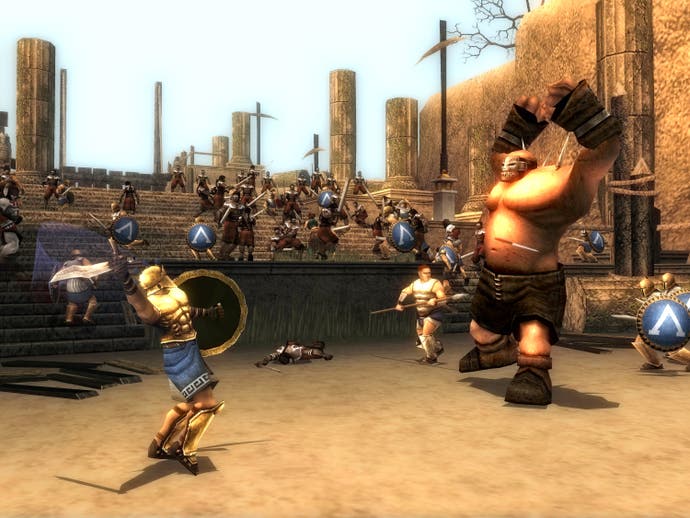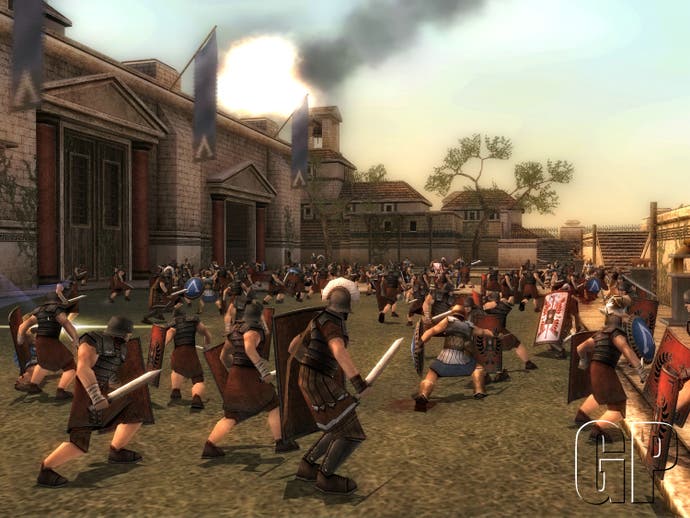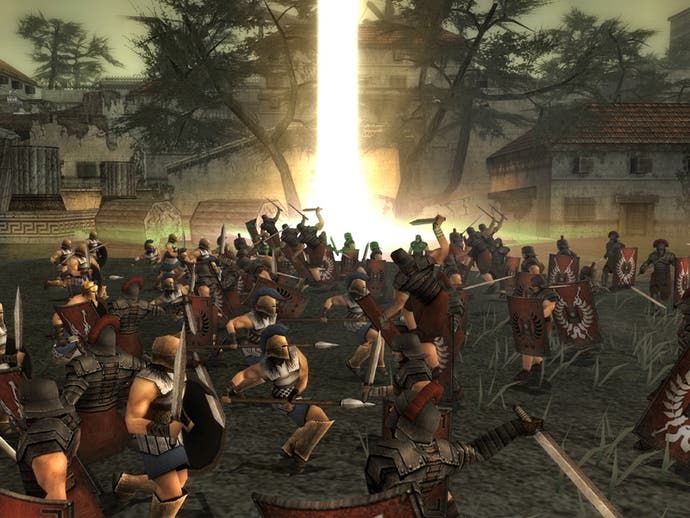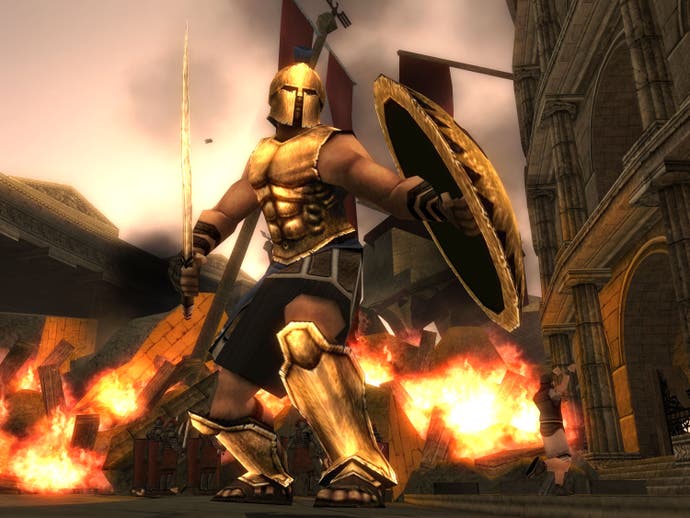Spartan: Total Warrior
More godlike than God of War?
This is a game about hitting people. It's pretty damn good.
With the review out of the way, there's plenty of time for a detour into an examination of the postmodernist re-imagining of ancient Greece in modern videogames (a.k.a. Man! Ray Harryhausen is awesome). Because when one game takes from a period and applies it to a genre, it's a singular thing. When two take from the same period then apply it to the same genre... well, it's looking kinda like a movement. If you squint.
I'll tell you the real reason why people are constantly taking great joy over reprocessing Ancient Greece in videogames, and the Spartans specifically. Obviously, it's been in loads of films and books, so its imagery we're all familiar with. And obviously, Greece is the founding culture of western society. But the real reason why we're all going crazy over the Spartans is... well, we know absolutely sod all about them. They were a warrior culture. They were dead hard. And that's about it, with any certainty.
Because the Spartans weren't big readers, so didn't write down anything themselves. The only records we have are from other cultures looking in... mainly the Athenians. That is, their main political and martial rivals. At which point, anyone who did GCSE history will be tutting about bias in the sources. In fact, the Athenian historians who did write about them tended to actually be sympathisers with the culture - or, rather, fetishisers. They admired the Spartans because they thought their own culture a little too soft. Which turns the historical records we have on Sparta into the equivalent of basing our knowledge of working class London culture on Lock Stock and Two Smoking Barrels.
In short, they're a hard-man Tabla Rasa for developers to play with. It's harder to get away with this with Rome, because we know too much about them - in Spartan's case, Rome is re-created as the fascist bad-guys (which is exactly what they were). Against them, we have Greece (cradle of civilisation) and Sparta (its brave defenders, who defeated millions of Persians with three soldiers and a piece of string). Since it's all foggy, there's no need to include other interesting demi-facts about the Spartans, such as the institutionalised homosexuality in Spartan Phalanx barracks or that they actually had a whole month of an open-hunting season on Helots. Which doesn't sound that bad, until you realise that "Helots" were the Spartan slave class.

Of course, all that would be harder to turn into a Dynasty Wars meets God of War slasher than just stealing all the good bits from Jason and the Argonauts, throwing them into the air and seeing where they all land. It creates a setting of a greek-style mythological world where Sparta was still a force to be feared when the Romans turned up to anex them (rather than having been in decline for several hundred years, as in the real world). You star as the eponymous Spartan.
The tone of Spartan: Total Warrior is nailed half-way through the first level, when you and your sidekick run into a new area, packed full of Romans warriors. And, in a beautifully curt cut-scene, he says something along the lines of "Hey - Romans! Let's slaughter them".
Yes. Let's.
Spartan distinguishes itself from the competition in one basic way. In fact, now reaching from the RTS to the fighter, it has become the Creative Assembly signature way to distinguish its games. That is, have hundreds of people running around at once. Initially playing it is a shock, immediately having a scope which few PS2 games - hell, few games full stop - manage to match. Opening scenes with you as a soldier among dozens in the defence of Sparta are reminiscent of Call of Duty's Russian scenes. Epic is the word.
While it doesn't match the base brutality of God of War, in terms of bodycount you manage to rack up scores which would be respectable for a plague. Expect the number of dead by your hand - not even your allies - to start at a hundred on a slow level, and climb towards five when it gets really bloody.
Which is where we hit the central question with Spartan: Total Warrior. Is it just a pretty button basher which leaves your fingers aching?

Well... it can be. And expect your fingers to be bleeding at the end of particularly violent sections. But, especially as you progress further, it's less a button-basher and more a game where you have to press the buttons a lot. There's a difference.
Due to the mass of people you have to regularly deal with, Creative has wisely aimed at creating a simple, but robust control system. It's based on two buttons, which are then modified by either your situation or other buttons. That is (in the PS2 version's case) "X" attacks one person and "O" will attack many. No matter how hectic things get, this is enough to anchor you and give your action a sense of purpose. So, when you do button-bash it's a case of your character being in the right place, and attacking without thought of defence is a right decision. Of course, if you're attacking people who are in a position to counter-attack, you're going to be in trouble.
Obviously, two attacks don't make a combat game. Except Kung-Fu Master, which was awesome, so we'll quickly move on before anyone points out the hole in the theory. Holding down defence (L2) blocks your enemy's move, but you can also pull off shield-bashes and kicks to clear some space and break people's guards. Landing a series of blows increases your rage meter, which allows a Rage attack to be unleashed via the R1 button, either brutally taking apart an unlucky individual (with X) or a group (with O). L1 activates your limited number of arrows, firing either individually (with X) or in salvos (with... oh, you get it now, surely?). You'll find your most devastating attacks on R2. These are, as de-rigueur in every fighter post-Golden Axe, the extremely limited magic attacks, the exact nature of which vary depending on what weapon you have in your hands at any second. The group-attack with the dual-swords causes lightning to flare all around you. Alternatively, with the spear, you're surrounded by a halo of fire setting anyone who strikes you or you strike ablaze. The weapons, slowly released during the game, also alter all the base attacks, with one of the game's major strategic elements being to decide which of your arsenal to have out for any particular battle.
It's so simple that it can trick you into thinking there's nothing to it. However, the fights it sets up demand contextual awareness. It's not enough to be aware of who you're fighting - but who everyone else is. If you can, it's wiser to take someone down who is busy fighting someone else with a crafty stab in the back rather than go through the process of breaking someone's guard - which can be a little tricky with some of the harder enemies.

The demand it sets up to prevent it from being a pure button basher is... well, the demand. It isn't an easy game. Some of the situations are seriously difficult, with certain slogs - especially if you haven't being managing your health level as well as you should have been, and used up the local rechargers - approaching the level of hair-pulling. While there's none of God of War's actual puzzling (Second mention - sorry. While they're very different games, it's also the easiest reference point), it often takes a leap of tactical insight to work out how to triumph in a situation. When you have your full armoury of five weapons (Sword and Shield, Dual swords, Bow, Hammer and Spear), correctly diagnosing which of your God powers is needed to turn a battle becomes something of a science. Damn! I turned everyone to stone. What I should have done is fired off a lightning bolt to take out that ridge of archers that are slaughtering everyone. When Spartan is flowing - that is, when the blood is - it's a compulsive joy.
What keeps it away from higher awards is occasionally it reaches too far. Some of the design is a little kill-happy. Some levels with ledges are a boon for the player with an aptitude for shield-barging entire legions off them, but the tendency for you to follow them can be frustrating. That each level is so long also plays against it. While the checkpoints - with a few exceptions - are positioned with skill, there are a few occasions when you'll find you've exhausted all your health supplies, only to discover there's another section for you to complete with only the tiniest sliver of energy left.
There are also some minor selection problems. The combat targeting is mostly fine - though it could be a little more generous when trying to apply a single-person power-attack in a mass-melee - firing your last divine energy into a defenceless soldier rather than the big boss standing beside him is more than a little frustrating. Worst is the selection of background items, occasionally demanding too precise positioning in the heat of combat.

And there's no way I'm going to score this any higher after it had me screaming at one end of level boss for two hours. Hint for designers: Introducing an insta-kill weapon that's really tricky to avoid four minutes into a sequence is not a way to endear yourself to the gamers of the world.
Cripes. Scanning the last couple of paragraphs, perhaps it's not only the Spartan who can go on Rage attacks.
Stepping back, the joy of Spartan isn't really akin to the Call Of Duty reference I threw up earlier. It's more like Halo, in that it comprises of a series of skirmishes which play out according to all the individual characters' AI. This means that specific fights play out with considerable differences depending on what your player does. It's this aspect - reliant on AI rather than scripting - which manages to keep Spartan interesting in its most difficult times when a more ordered game would lose your interest. Yes, you're stuck on the same bit, but it's the same bit which plays out just differently enough to keep your interest.
To deal with the inevitable question, no, it's not as good as God of War. There's no shame in that, given that God of War is going to top a fair few sites' Game of the Year lists. However, luckily for Spartan, they're also such different games that direct comparisons don't reveal much. There's none of God of War's puzzling or platforming or combos or badly-rendered polygon bosoms here. Just a whole lot of slick, entertaining violence.
This is a game about hitting people. It's pretty damn good.
Oh - and check comments for the inevitable people who've read more than a couple of books on Sparta to pick out all the mistakes in that little historical lecture upthread. It'll be educational for everyone.

